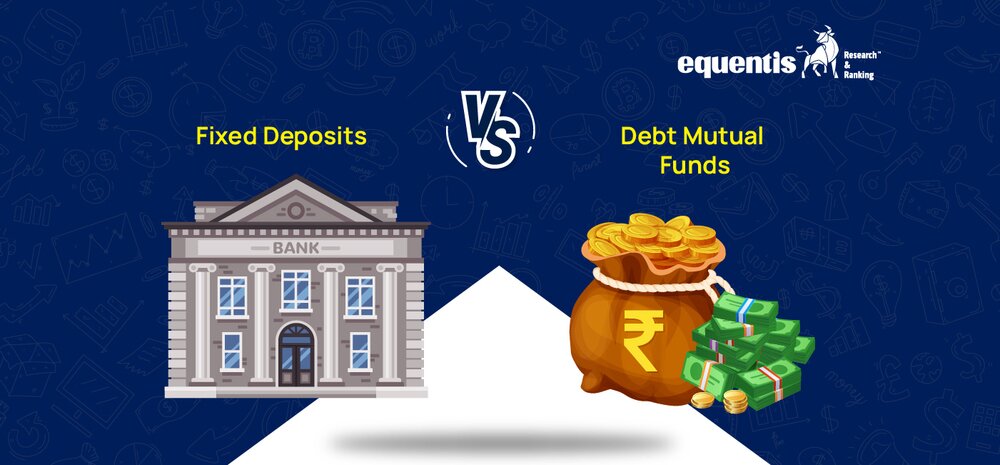Anita, a 30-year-old software engineer in Hyderabad, has just received a Rs. 3 lakh bonus and is looking to make a smart investment. Her family favours bank fixed deposits, appreciating the security and assured returns they offer.
However, Anita is considering an alternative: debt mutual funds. Though they involve market risks, debt funds often provide better returns while offering some stability.
So, what should Anita choose? Stick with the tried-and-true security of fixed deposits, or explore the potentially higher returns of debt mutual funds? In this guide, we’ll compare the benefits of traditional FDs with the flexibility and growth potential of debt mutual funds to help you make an informed investment decision.
Fixed Deposits: Reliable and Secure
Fixed Deposits, often called FDs, are among the most secure investments in India. They are deposit accounts with banks or financial institutions where a fixed amount is invested for a predetermined period, yielding a guaranteed interest. FDs are a traditional choice for risk-averse investors due to their assured returns and capital safety.
Benefits of Fixed Deposits
- Guaranteed Returns: FDs are not market-linked, so returns remain unaffected by market fluctuations. This makes them ideal for individuals seeking stability.
- Flexible Tenures: FDs offer tenures ranging from 7 days to 10 years, catering to both short-term and long-term goals.
- Interest Rate Options: Interest rates for FDs vary based on the tenure, with senior citizens often receiving slightly higher rates.
- Low Risk: FDs are government-regulated and come with deposit insurance, up to INR 5 lakh, which provides added security for investors.
Returns on Fixed Deposits
Fixed Deposit rates fluctuate based on economic conditions but typically range between 5% to 8% per annum for regular investors. Senior citizens usually enjoy an additional 0.5% interest rate. While this makes FDs secure, the returns may not outpace inflation in the long term, especially when the tax on interest is considered.
Taxation on Fixed Deposits
Interest income from FDs is fully taxable. The interest earned is added to the investor’s income and taxed according to their applicable tax slab. For investors in higher tax brackets, this can significantly reduce net returns.
Example of Returns: If you invest INR 1,00,000 in a 5-year FD at 7% per annum, the return at the end of the period would be around INR 1,40,255. However, after tax deductions, particularly for those in higher tax brackets, the effective return reduces further.
Debt Mutual Funds: Market-Linked but Stable
Debt Mutual Funds (DMFs) are mutual fund schemes that primarily invest in fixed-income securities like government bonds, corporate bonds, treasury bills, and money market instruments. Unlike FDs, DMFs offer market-linked returns, meaning returns can vary depending on interest rate changes and market dynamics. However, they are generally less volatile than equity mutual funds, making them a moderate-risk investment.
Benefits of Debt Mutual Funds
- Potential for Higher Returns: While returns are not guaranteed, DMFs typically offer returns between 5% to 9%, depending on the scheme and market performance.
- Liquidity: DMFs are more liquid than FDs, allowing investors to withdraw funds whenever required without a fixed lock-in period.
- Tax Efficiency: DMFs are tax-efficient, especially for long-term investments, due to the indexation benefit on long-term capital gains.
- Portfolio Diversification: Investing in DMFs allows investors to diversify within fixed-income securities, balancing risk across various instruments.
Types of Debt Mutual Funds
- Liquid Funds: Ideal for very short-term investments, usually offering better returns than a savings account.
- Short-Term Funds: Suitable for holding periods of 1-3 years, investing in debt instruments with shorter maturities.
- Dynamic Bond Funds: These funds adjust based on changing interest rates, making them ideal for long-term investors who can tolerate moderate risk.
- Gilt Funds: These funds invest primarily in government securities, making them low-risk but sensitive to interest rate changes.
Returns on Debt Mutual Funds
Debt Mutual Funds do not guarantee returns but typically offer returns in the range of 6% to 9% over a longer horizon. They have historically provided inflation-beating returns, especially when held for 3+ years. This can make them more rewarding than FDs, though with a slight increase in risk.
Taxation on Debt Mutual Funds
- Short-term capital gains: Taxed at the investor’s marginal slab rate
- Long-term capital gains: Taxed at 12.5% without indexation for funds purchased before April 1, 2023. For funds purchased after April 1, 2023, the tax rate is still short-term.
- Holding period: The holding period for classifying gains as long-term is 12 months for listed securities and 24 months for unlisted securities.
Example of Returns: Consider an investment of INR 1,00,000 in a Debt Mutual Fund, yielding an average annual return of 8% over 5 years. With indexation benefits on long-term gains, the effective tax burden reduces, leading to higher net returns than FDs.
Key Comparisons: Fixed Deposits vs. Debt Mutual Funds
Here is a short comparison of fixed deposits vs debt mutual funds.
| Feature | Fixed Deposits | Debt Mutual Funds |
| Returns | Fixed (5% – 8%) | Variable (6% – 9%) |
| Risk | Low | Moderate |
| Liquidity | Limited, penalties on premature exit | High, redeemable anytime |
| Tax on Returns | Taxed according to income slab | LTCG taxed with indexation benefits |
| Inflation Protection | Low | Moderate to high |
| Ideal for | Conservative investors | Investors comfortable with moderate risk |
In conclusion, both Fixed Deposits and Debt Mutual Funds have their place in a balanced portfolio. Fixed Deposits offer capital safety and predictable returns, making them ideal for risk-averse individuals or those close to retirement. On the other hand, Debt Mutual Funds provide market-linked returns with tax advantages for long-term investors, making them suitable for those with a moderate risk tolerance. Ultimately, the choice depends on your financial goals, investment horizon, and risk appetite.
Disclaimer Note: The securities quoted, if any, are for illustration only and are not recommendatory. This article is for education purposes only and shall not be considered as a recommendation or investment advice by Equentis – Research & Ranking. We will not be liable for any losses that may occur. Investments in the securities market are subject to market risks. Read all the related documents carefully before investing. Registration granted by SEBI, membership of BASL & the certification from NISM in no way guarantee performance of the intermediary or provide any assurance of returns to investors.
FAQ
Are Fixed Deposits safer than Debt Mutual Funds?
Yes, Fixed Deposits are generally safer than Debt Mutual Funds as they provide guaranteed returns and are often insured by banks. Debt Mutual Funds are subject to market risks, which can affect returns.
Which option offers better tax benefits, Fixed Deposits or Debt Mutual Funds?
Debt Mutual Funds can offer better tax benefits, especially for investments over three years, as they are subject to long-term capital gains tax with indexation benefits. Fixed Deposits are taxed based on the investor’s income tax slab.
Can I withdraw funds from a Debt Mutual Fund anytime?
Yes, most Debt Mutual Funds offer flexibility for withdrawal. However, some funds may have an exit load if redeemed within a specific period, so it’s important to check the fund’s terms.
How useful was this post?
Click on a star to rate it!
Average rating 3 / 5. Vote count: 1
No votes so far! Be the first to rate this post.
I’m Archana R. Chettiar, an experienced content creator with
an affinity for writing on personal finance and other financial content. I
love to write on equity investing, retirement, managing money, and more.
























